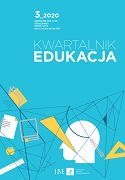KODA – niewidoczne specjalne potrzeby uczniów w systemie edukacji
CODA – The Unseen Special Needs of Students in the Education System
Author(s): Dorota Podgórska-JachnikSubject(s): Education, Health and medicine and law, Inclusive Education / Inclusion
Published by: Instytut Badań Edukacyjnych
Keywords: CODA; deaf parents; KODA; special educational needs;
Summary/Abstract: The concept of special educational needs has emerged in both global and national educational discourse to alert educators to the necessity of providing special support to some students. Without such support, these students may have difficulties with learning or behaving, making psychological-educational support – which in principle should be available to every student – particularly important in their case. Special educational needs (SEN) are defined as those children who, because of learning difficulties, need special conditions, methods, programmes, aids, communication methods, etc.32 It is a concept that can be called classical because it comes from the author who is credited with introducing the term. A child with SEN is a child that requires special teaching and educational interventions. However, not all the different needs are equally visible to teachers. The text discusses the subject of hearing children of deaf mother/father, known as KODA (Kids of Deaf Adults), who go beyond the traditionally understood catalog of students with SEN.
Journal: EDUKACJA
- Issue Year: 153/2020
- Issue No: 2
- Page Range: 59-72
- Page Count: 14
- Language: Polish

